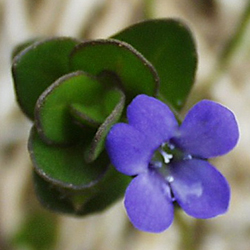Plant Profile: Lemon Bacopa/ Blue Waterhyssop, Bacopa caroliniana
By Jacqueline Maxwell, Joshua West, and Megan Van Fleet
This post is one of a series from professor Nisse Goldberg's Botany students at Jacksonville University.
 |
| Figure 1. Succulent leaves of lemon bacopa. Photo credit: Shirley Denton. |
Kingdom: Plantae
Division: Magnoliophyta
Class: Magnoliopsida
Order: Plantaginales
Family: Plantaginaceae
Genus: Bacopa
Specific epithet: caroliniana
Description
Bacopa caroliniana, commonly known as lemon bacopa or blue waterhyssop, thrives in both fresh and brackish water. This aquatic herb can be found in both ponds and wetlands throughout the state, where it prospers in shallow water. Lemon bacopa is one of three native Bacopa species in
 |
| Figure 2. B. caroliniana with bronzed leaves & flowers held above water. Photo credit: Roger Hammer. |
The plant's common name is derived from its bright green, succulent leaves (Figure 1), which, when crushed, have a lemony scent. The leaves can also change color, turning red or bronze with increased light intensity,(Figure 2). Lemon bacopa is not very tall (4-6 inches), but its lateral growth is significant. It appears to creep across the surface, sprawling in all directions. Of the species found in Florida, it is the only one to produce blue flowers and these are typically found above water (Figure 2).
Looking for a plant to accent your home aquarium? Lemon bacopa is fairly easy to grow, so give it a shot. Contact the Florida Association of Native Plants to find a vendor near you. After you’ve got one, you can propagate it from the side shoots and share it with a friend!
References
- http://plants.ifas.ufl.edu/node/60
- http://www.floridaplants.com/Eflora/bacopa_caroliniana.htm
- http://www.ehow.com/info_8133183_information-bacopa-caroliniana.html#ixzz1ra9gX100
- http://www.aquaticplantsofflorida.com/bacopacaroliniana.htm
- http://www.floridaaquatic.com/aquarium_plant_bacopa_caroliniana.html
- http://en.wikipedia.org/wiki/Bacopa_caroliniana
- Wunderlin, R. P., and B. F. Hansen. 2008. Atlas of Florida Vascular Plants (http://www.plantatlas.usf.edu/). [S. M. Landry and K. N. Campbell (application development), Florida Center for Community Design and Research.] Institute for Systematic Botany, University of South Florida, Tampa.
Figure 1. http://www.shirleydenton.com/plants/web_pics/b/bacop_car_fl2.jpg
Figure 2. http://florida.plantatlas.usf.edu/Photo.aspx?id=6956



Comments
Great profile.